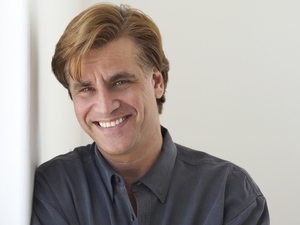I used to listen to the radio so much I actually played it all night while I slept when I was a teenager. Then I stopped for about thirty-five years and just started again this past weekend when it occurred to me it’s a really easy way to listen to music without getting up and changing the CD all the time.
 So I was listening one day when I found myself in the middle of the most wonderful interview with Aaron Sorkin, the screenwriter responsible for A Few Good Men, Social Network, and West Wing.
So I was listening one day when I found myself in the middle of the most wonderful interview with Aaron Sorkin, the screenwriter responsible for A Few Good Men, Social Network, and West Wing.
Sorkin was promoting his new television drama called The Newsroom on HBO, starring Sam Waterston and Jeff Daniels.
And I’ll tell you, although I haven’t watched television in fifteen years, after listening to Sorkin talk about writing and storytelling and the work he does I am ready to watch that darn show.
Sorkin speaks so intelligently and so beautifully about our craft:
-
dialog
“I love the sound of dialog. It’s like music to me. David Mamet is the master of writing two people communicating who don’t know how to communicate. I like to take characters who are hyper-articulate and see what happens when you give them a silence when they can’t think of what to say.”
-
action
“In A Few Good Men I had Tom Cruise driving along and pull over to pick up a copy of Sports Illustrated. He pulls over, hops out, buys the magazine, and hops back in again. That’s about as active as my action scenes get.”
-
complex character
“Don’t confuse me with my characters. I have never in my life written autobiographical.”
This isn’t Sorkin speaking about himself below: this is a character he created. Study how much contrast, backstory, and information he’s packed into a single line:
‘I’m a registered Republican—I only seem liberal because I believe hurricanes are caused by high barometric pressure and not gay marriage.’—Jeff Daniels as Will McAvoy, protagonist of The Newsroom
-
reader investment
“In thinking about writing a show about the news, I didn’t want to invent catastrophes for my characters to cover. It finally hit me I could use recent news events. That way the audience knows more about what’s happening than the characters, and I can use that leverage.
“The audience wants to yell at the screen, ‘I know how this is going to turn out! Pay attention!‘”
-
conflict
“I have people surrounding me who help me find the point of conflict in a scene: the information, be it the BP oil spill or immigrations.”
-
theme
“I like to show that it’s okay to be alone in a big city if you can find a workplace family.
“And I like heroes who don’t wear disguises in the real world.
“You think, ‘Why can’t that be the real world?'”
-
reader sympathy
“We connect to people who are trying. And we connect a lot to people who are failing a lot. Because that’s what we do.”
Suddenly, I love Aaron Sorkin.
DISCLAIMER: I’m probably misquoting him like crazy because I listened to this instead of reading it, but you can get the real quotes from the NPR interview transcript.
2nd DISCLAIMER: When I worked in offices in the old days, maybe it was just us, but we never french-kissed on the public stairs. We took long lunch hours like civilized people.
